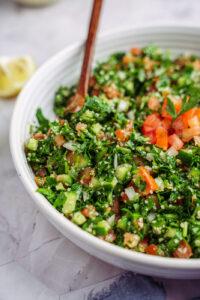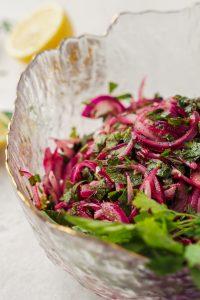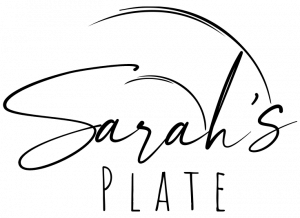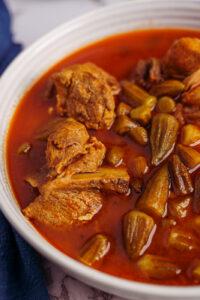Fattoush is one of the most beloved salads in our house. It’s bright, tangy, fresh, and full of texture thanks to crispy pita chips and a vibrant mix of vegetables and herbs. Whether it’s a light lunch on its own or served alongside grilled meats and vermicelli rice, Fattoush never fails to bring that perfect balance of flavor and crunch to the table.
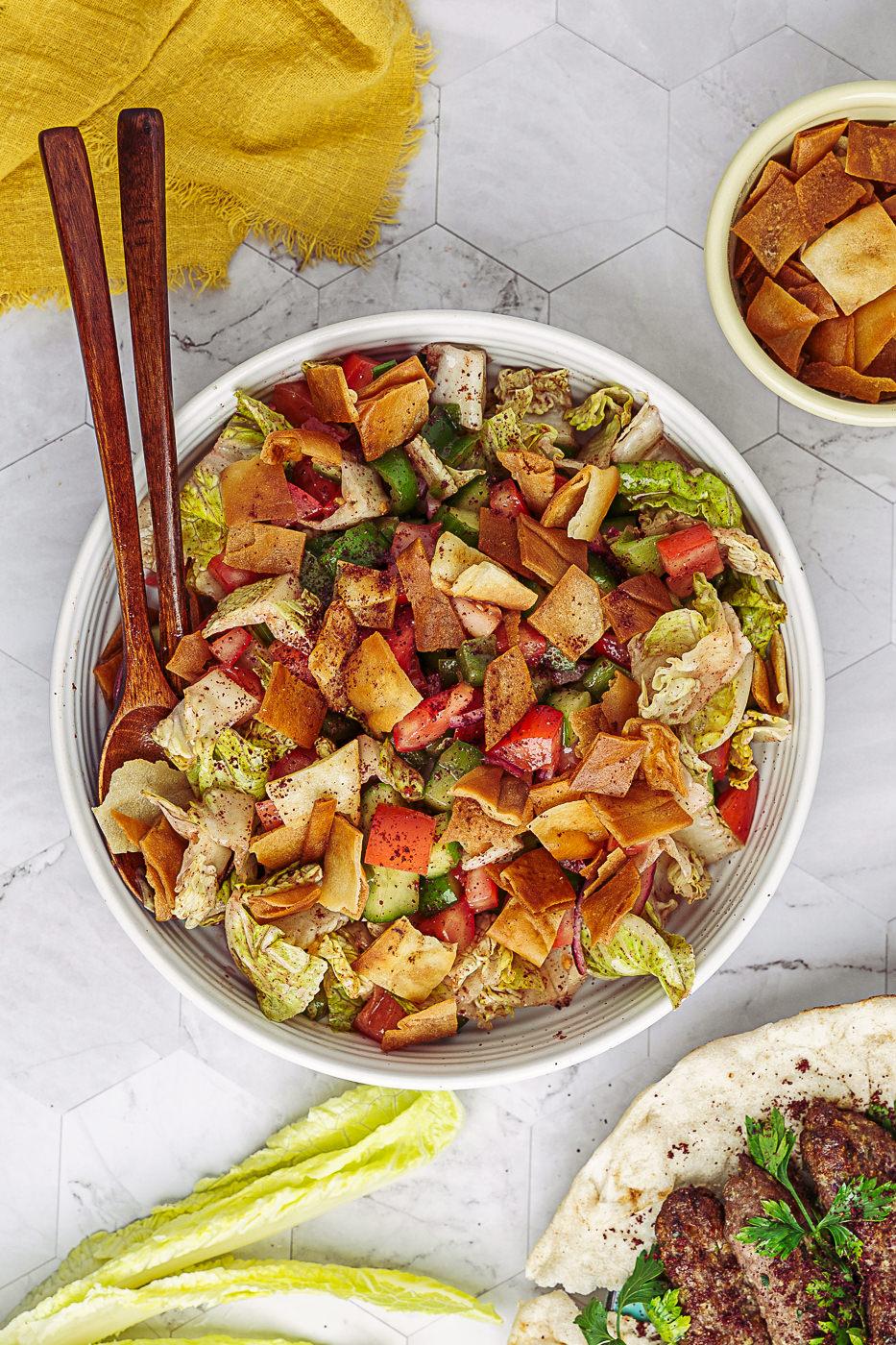
What is Fattoush?
Fattoush is a traditional Levantine bread salad that originated as a way to use up leftover pita bread. In Arabic, the word “Fattoush” comes from fatteh, which means “crumbs” or “bits of bread.” It’s a humble dish with a rich cultural background, made by tossing toasted or fried pieces of pita with seasonal vegetables and herbs, and dressing it with a citrusy, sumac-spiced vinaigrette.
In my kitchen, Fattoush is a regular on our weekly menu. I love to fry my pita bread when I want that deep, savory flavor only frying can give. But more often, I toast the pita chips in the oven with a drizzle of olive oil, they still get golden and crisp, and it’s a bit lighter and less messy.
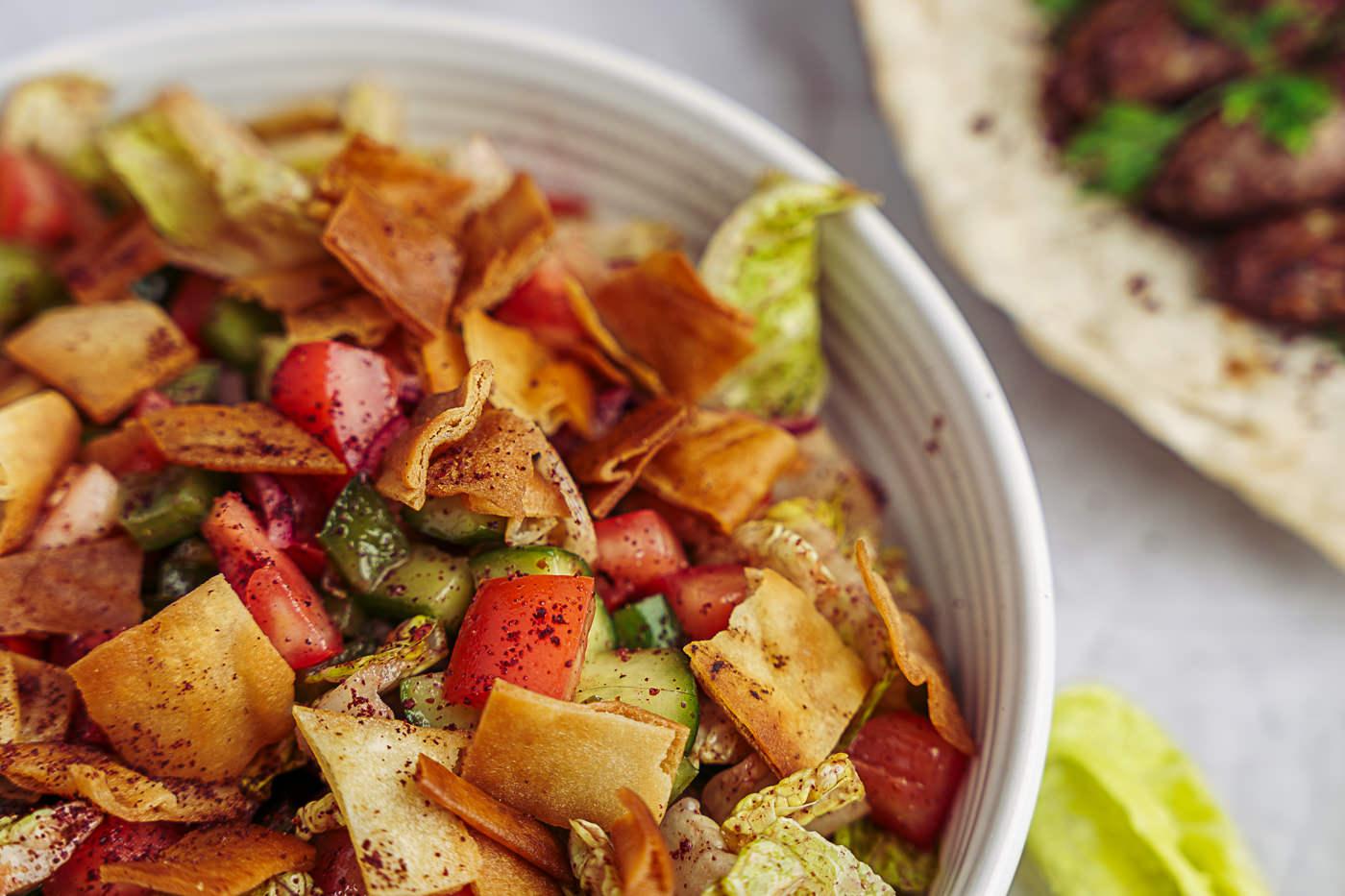
Ingredients needed to make Fattoush
- Pita Bread (Toasted or Fried): Pita is what makes Fattoush different from other salads—it turns it into a hearty, satisfying dish.
- Vegetables : The most common used vegetables for Fattoush are Lettuce It’s the base of the salad, tomatoes, cucumber and green pepper. Other optional vegetables I’m using are green onions, Red onions. I usually use whatever vegetables I have in hand.
- Sumac: Sumac is essential in Fattoush, it gives the dressing its lemony tang without the acidity of vinegar. It’s what makes the salad unmistakably Middle Eastern. You can look up for sumac at any middle eastern and Mediterranean stores or online. I usually buy whole sumac seeds and grounded myself to keep it as fresh as possible. If whole seed not available I would recommend this brand.
- Pomegranate Molasses: It adds complexity to the dressing with its sweet and tart flavor. Also it gives the salad a glossy finish.
- Other dressing ingredients: like olive oil, lemon juice, salt.
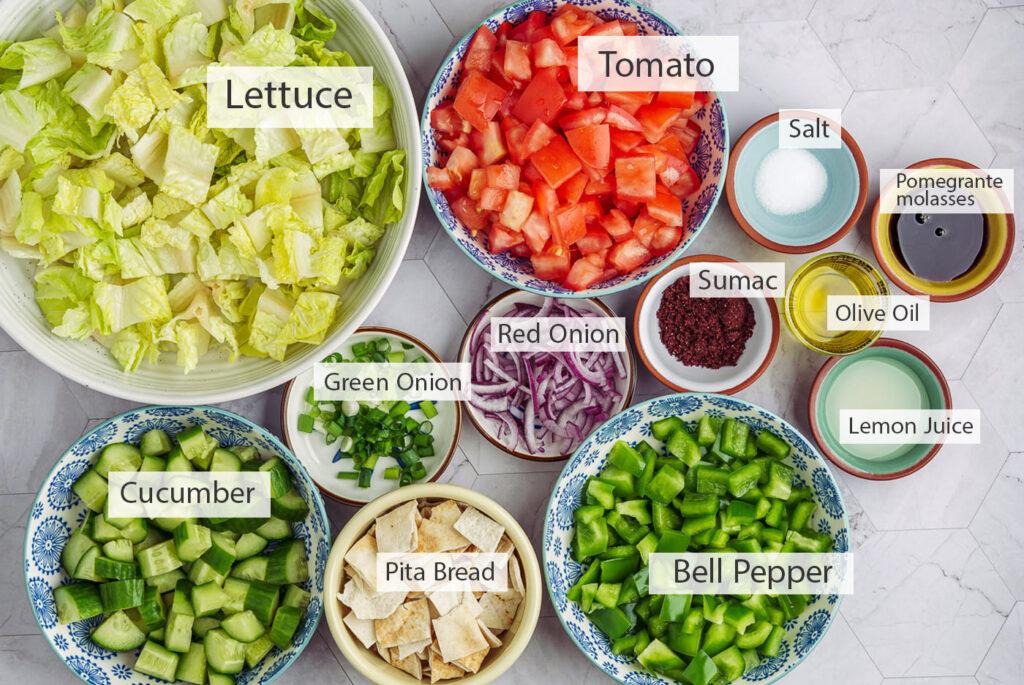
How to Make Fattoush Step by Step
- Preparing Vegetables: Chop everything into bite-sized pieces to make the salad easy to eat and well-balanced. Finely chop green onion (the green and white part) and chop red onion into thin slices. Place everything into a large salad bowl.
- Prepare the Dressing: In a small bowl or jar, combine the olive oil, lemon juice, pomegranate molasses, sumac, and salt. Whisk the dressing until well combined.
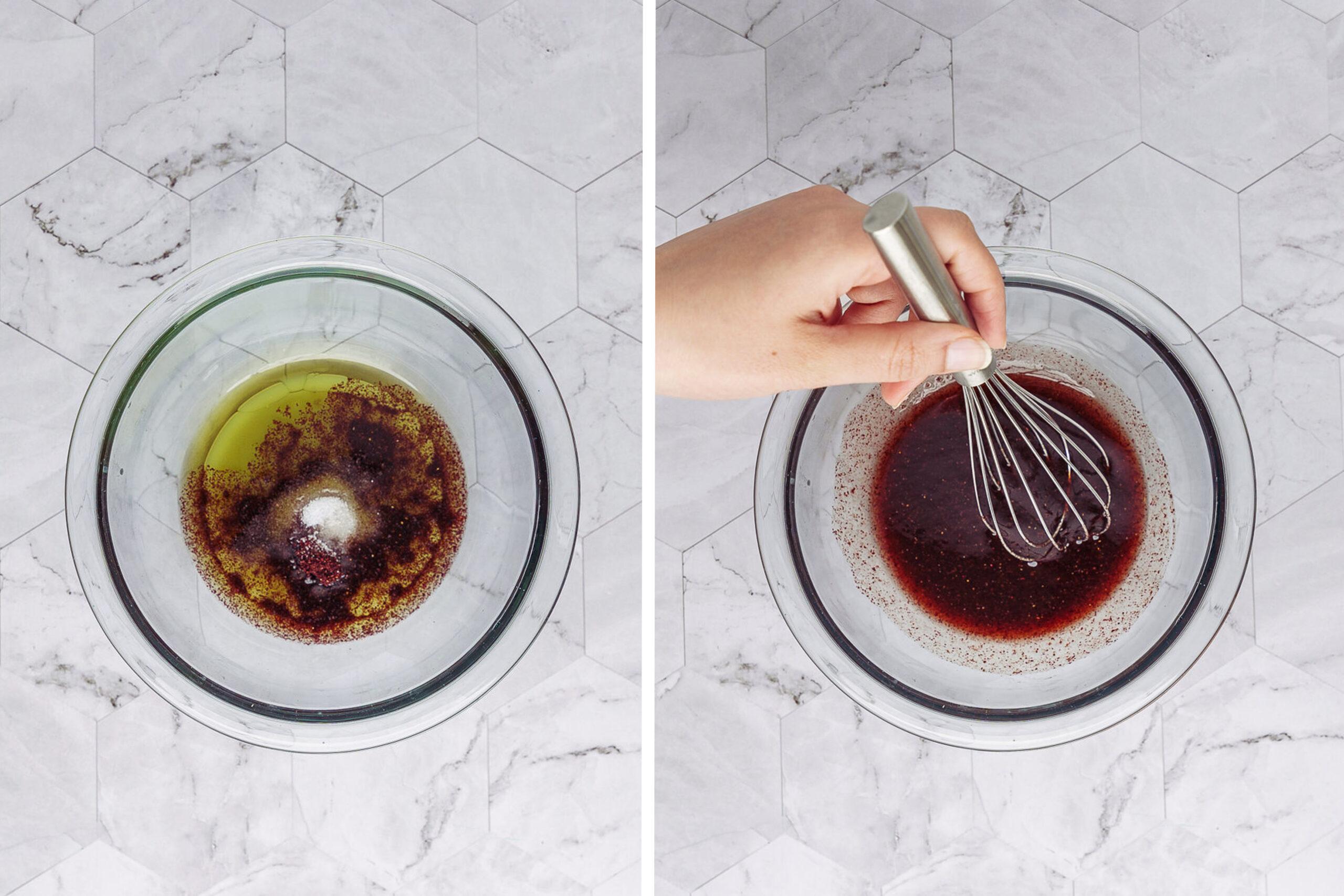
- Prepare the Pita Chips: Heat vegetable oil or any oil you prefer (I use refined coconut oil) in a skillet over medium heat. Once hot, fry the pita bread pieces in small batches until golden brown and crispy (about 2–3 minutes per batch). Remove the chips and drain on paper towels.
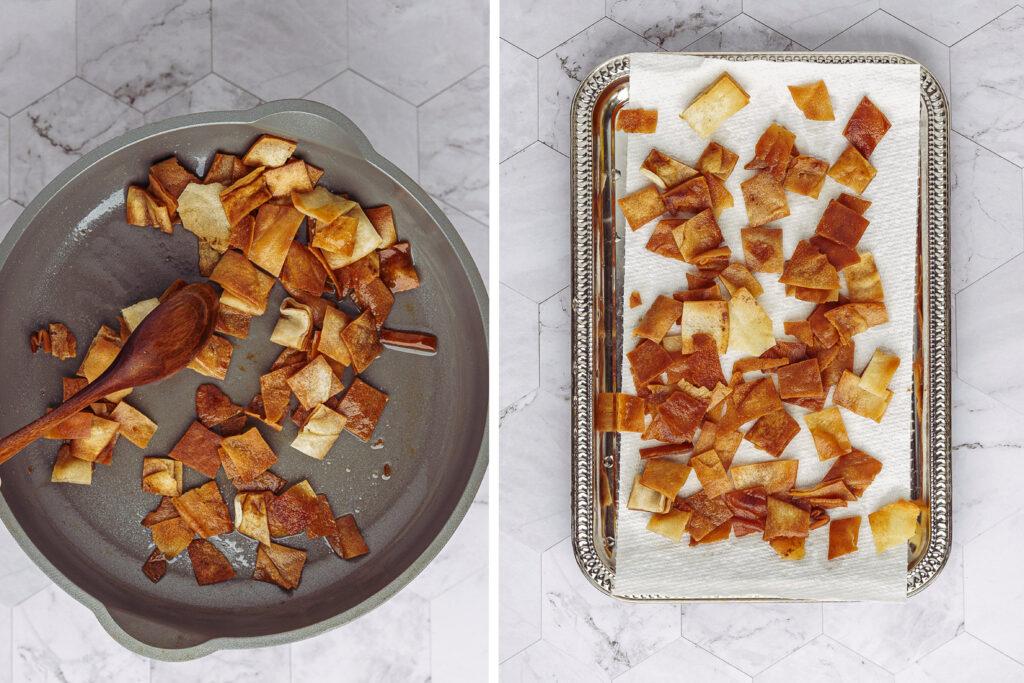
- Assemble the Salad: In a large mixing bowl, combine the chopped vegetables. Pour the dressing over the vegetables and toss gently. Be sure the dressing evenly coats everything.
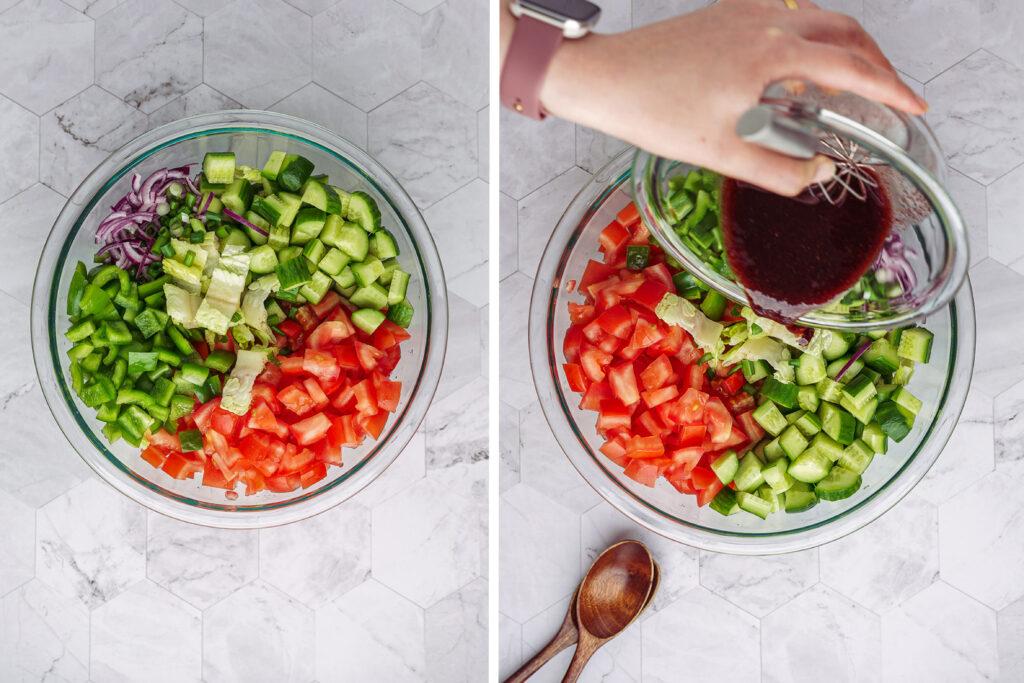
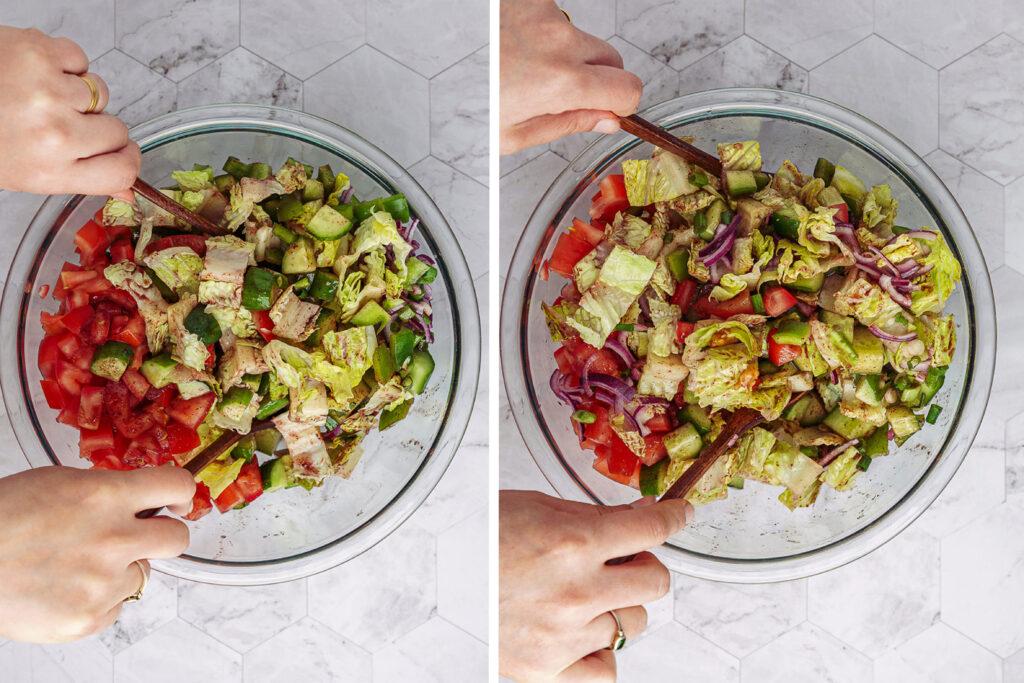
- Add the pita chips: Just before serving, toss in the fried pita chips. This ensures the chips stay crispy instead of getting soggy.
- Serve and Enjoy: Serve immediately! Fattoush is best enjoyed right away while the pita chips are crisp and the vegetables are fresh. You can garnish with a few mint leaves or a sprinkle of sumac for a burst of color and extra flavor.
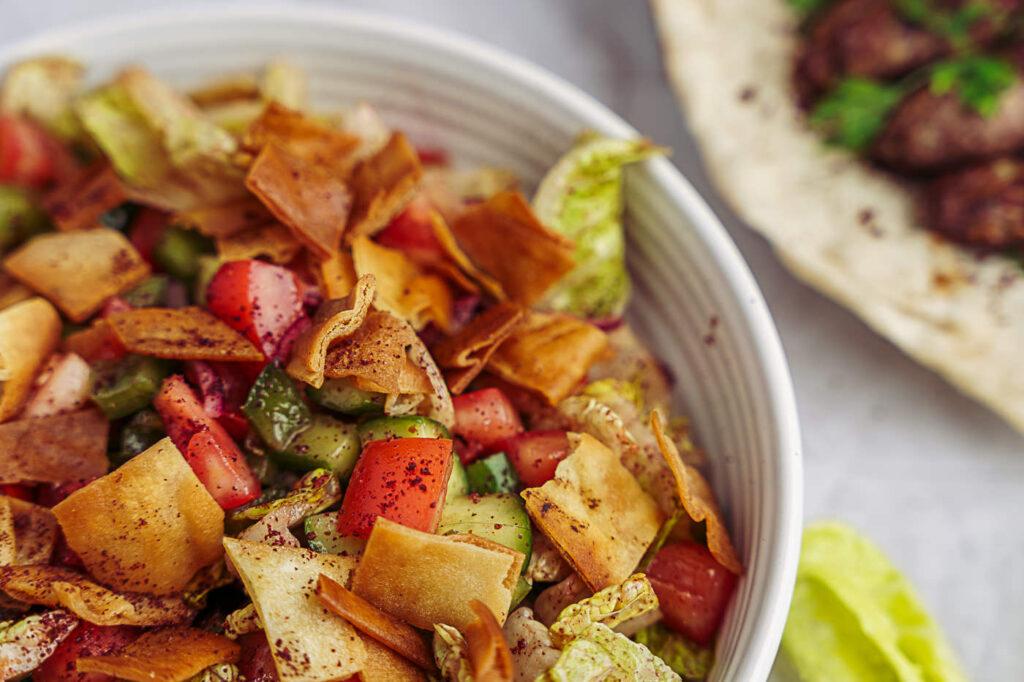
Pro Tips for the Perfect Fattoush
- Don’t dress it too early: If you dress the salad too soon, the pita chips will absorb the dressing and lose their crispness. Always add the chips right before serving.
- Customize the veggies: Feel free to adjust the vegetables based on your preferences.
- Adjust the sumac: Sumac is the star spice in Fattoush, but its tangy flavor can vary. Start with a teaspoon and taste as you go. If you want extra tang, add more sumac or a bit more lemon juice.
Serving Suggestions
Fattoush is incredibly versatile and pairs beautifully with grilled meats like shish tawook, chicken tikka, or kebabs, especially alongside vermicelli rice for a hearty Middle Eastern rice bowl. It also makes a refreshing side to dishes like falafel, shawarma, and complements mezze spreads with dips like hummus or baba ganoush. On its own, it’s a light, satisfying meal—especially when topped with chickpeas or leftover grilled chicken.
Here’s some recipes you might want to check out
- Beef Kofta Kebab ( Middle eastern kofta )
- Tabouleh (Middle Eastern Parsley Salad)
- Gers Ogaili ( Middle Eastern Saffron and Cardamom Cake )
- Lahm Bi Ajeen (A Middle Eastern Pizza)
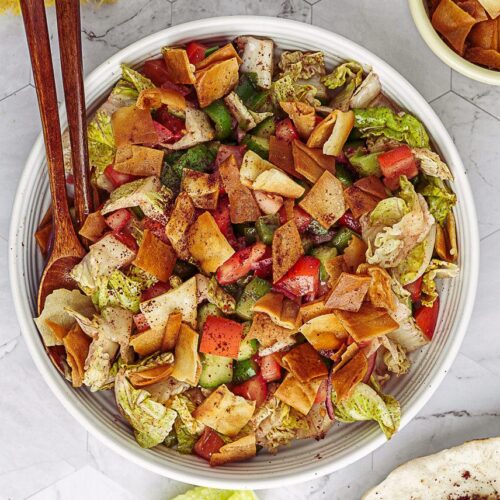
Fattoush Salad
Ingredients
For the Vegetables:
- ½ head of romaine lettuce
- 2 medium tomatoe
- 2 medium cucumber
- 1 medium green pepper
- 1 small red onion
- 1 green onion
For the Dressing:
- 2 tbsp olive oil
- 1 tbsp lemon juice
- 1 tbsp sumac adjust to taste
- 1 tbsp pomegranate molasses
- Salt to taste
For The Pita Chips:
- 1 large pita bread cut into 1" squares
- 1 tbsp olive oil or vegetable oil
Instructions
- Chop vegetables (lettuce, tomato, cucumber, pepper ) into bite-sized pieces.
- Finely chop green onion (the green and white part) and chop red onion into thin slices.
- Place everything into a large salad bowl.
- In a small bowl or jar, combine the olive oil, lemon juice, pomegranate molasses, sumac, and salt. Whisk the dressing until well combined.
- Heat oil in a skillet and fry the pita pieces until golden brown. Drain on paper towels.
- Assemble: Just before serving, pour the dressing over the salad and toss to combine. Add the pita chips last to keep them crisp.
Notes
- Don’t dress it too early: If you dress the salad too soon, the pita chips will absorb the dressing and lose their crispness. Always add the chips right before serving.
- Customize the veggies: Feel free to adjust the vegetables based on your preferences. colorful bell peppers, radish, or even a handful of arugula can be great additions.
- Adjust the sumac: Sumac is the star spice in Fattoush, but its tangy flavor can vary. Start with a teaspoon and taste as you go. If you want extra tang, add more sumac or a bit more lemon juice.

